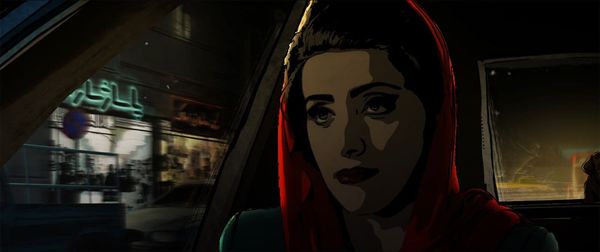Eye For Film >> Movies >> Tehran Taboo (2017) Film Review
Tehran Taboo
Reviewed by: Jane Fae

Tehran Taboo is dark: make no mistake. A dark, pessimistic film, focused primarily on what it is like to be female in a society founded on institutional misogyny and violence against women. Though look closely and you will see, through the cracks, the toxic effect that this has on men too - either as lesser victims or as brute, dehumanised perpetrators of the violence that is everywhere.
If you thought – as the Great British censor once did – that cartoon is a “childish medium” suitable only for children and, from the Beano to Disney, capable only of depicting narratives fit for kids, think again. We never did that? But yes, that is precisely the notion that long informed British official attitudes to cartoon as a form. Thus parliament passed the rather ridiculous and rarely used Children And Young Persons (Harmful Publications) Act in 1955. And later, in the 1970s and Eighties, this was why pretty much the only continental cartoons allowed in the UK were the safe and Gallic - Tintin and Asterix.

Not a hint, this side of the channel, that over in Europe, “bande dessinée” ranged far and wide over adult themes, from political commentary to detective novels to a no-holds barred exploration of sex and sexuality.
Directed by Ali Soozandeh, and with a sharp script by Soozandeh and Grit Kienzlen, Tehran Taboo falls very much into this non-English tradition. It is billed as the story of four young people from Tehran, in Iran, “forced to break the taboos of a restrictive, Islamic society”, in a desperate search for freedom and happiness. This is about as accurate as suggesting that the Scottish play is about how, on the death of King Duncan, Macbeth ascends to the throne with a little help from his wife.
Because Tehran Taboo pulls no punches. From its opening, when Pari (voiced by Elmira Rafizadeh) “goes down” on a taxi driver wending his way through the streets of Tehran, while her mute son Elias sits obediently on the back seat, it is one horror after another. Pari suffers because she has been forced into prostitution through poverty. That, in turn, is due to the fact that her husband, an imprisoned drug addict, refuses either to divorce her or to give her permission to work.
As the film unfolds, we are introduced to her neighbour, Sara (voiced by Zar Amir Ebrahimi), who is pregnant and slowly drowning in a life boundaried by the demands of a domineering mother-in-law and her sick husband. Sara, too, would like to work: is barred from doing so by her husband.
Last up is the story of aspiring musician, Babak (voiced by Arash Marandi) and Donya (voiced by Negar Mona Alizadeh), a young woman with whom he has a one-time sexual encounter at an underground party. Except Donya was a virgin and, she tells Babak, due to be married - so now she needs an operation to “restore” her virginity, in a country in which such procedures are expensive, or unlawful, or both.
Any one of those would make for a gripping film and the inclusion of the three separate narrative strands which, as the film unfolds, we discover are interwoven, only adds to the force of what Tehran Taboo is telling us. And this is that the entire society in which they are situated is sick. Perhaps not doomed, but mired in an eternal state of despair, wherein the only possible choices are compromise and eventual complicity or flight.
In the end, that is the saddest, most upsetting take from this film. The society it depicts is one in which ordinary people – and especially women – are crushed beneath the joint burdens of a medieval moral code, and an unfeeling bureaucratic enforcement process. The two feed off one another, creating a sense of constant tension and danger, as even the most minor infraction, such as holding hands in public, can result in instant arrest by the morality police.
A more optimistic film would show the human spirit standing strong and asserting itself. Yet the message throughout Tehran Taboo is quite other - everyone who lives under this regime, whether judge or janitor, is eventually coarsened and corrupted by it. Even the protagonists, with whom our sympathies naturally lie, are flawed. In the end, the character who best survives – Pari – is also the most cynical, the one with fewest illusions about what she needs to do.
Even the cat, initially suspicious of human kindness, is betrayed and suffers for what elsewhere is ordinary everyday act, placing their trust in humans. And a note of caution here for cat lovers: the film includes a scene that will upset you. Greatly. You have been warned.
Is there hope? Yes. And hope, too, comes in feline form, in the shape of a simple innocent friendship between Elias and a kitten. Otherwise, be prepared for a shock: because the world of Tehran Taboo is not some imagined future nightmare but dystopia now and, if it is even a little true, a serious indictment of the regime in Iran today.
This, for obvious reasons, cannot be filmed on site, which is why this narrative is more easily explored in cartoon form.
Reviewed on: 14 Jan 2019
















